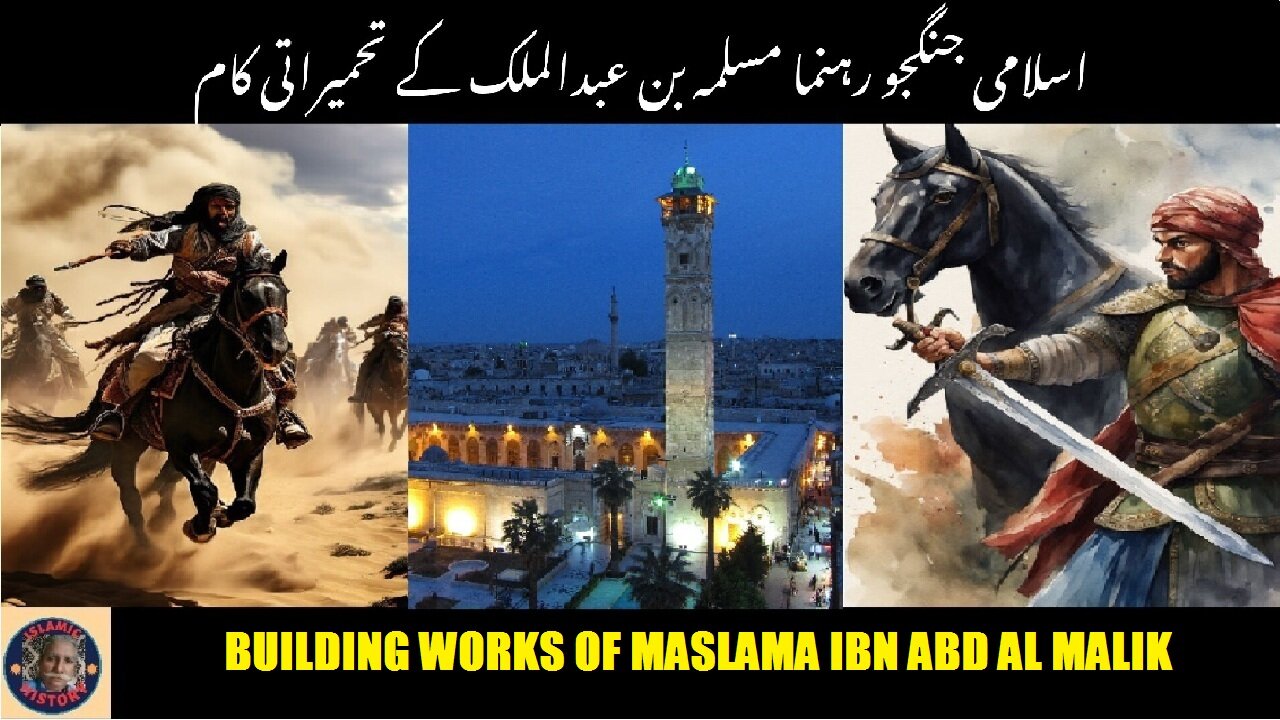Premium Only Content

Building works of Maslama ibn Abd al-Malik مسلمہ بن عبد الملک کے تعمیراتی کام
@islamichistory813 #ArchitecturalHistory #MaslamaIbnAbdAlMalik #CulturalHeritage
Building works of Maslama ibn Abd al-Malik
Dekhti Aankhooon aur sountay kaanoon ko Asslamoalaikum, sisters, brothers friends and elders, in this islamic warrior leaders informative video, we are describing the remarkable construction endeavors of Maslama ibn Abd al-Malik, an influential Umayyad leader. Through detailed analysis and visual representations, we will showcase the key structures he commissioned and their impact on the architectural landscape of the time. Discover the artistry and engineering behind these monumental works.
The historian Jere L. Bacharach speculates that Maslama was the most likely founder of the Umayyad Mosque of Aleppo, whose original construction is otherwise attributed to al-Walid I or Sulayman. Most of the present structure dates to the 12th–13th centuries. Bacharach bases his view on Maslama's governorship of Qinnasrin and his possible use of Aleppo as a base for the sawa'if, for which a congregational mosque to serve the troops would have made sense.The Umayyad-era qasr (castle) in Balis, a fortified residence with a canal and a wool production center, was possibly a construction by Maslama or Sa'id al-Khayr. Maslama may have been responsible for some construction works in the town of Qinnasrin. In Damascus, he had an iwan (enclosed hall) called after him alongside the residences of other Umayyad dynasts, including the caliphal Khadra Palace, situated behind the Umayyad Mosque.
Maslama's descendants inherited his estates and continued living in northern Syria after his death. In the aftermath of the Abbasid Revolution, which toppled the Umayyads in 750, an Abbasid officer harassed Maslama's family and seized his fortified residence at Na'ura. The incident provoked the Qaysi allies of Maslama's family, led by Zufar ibn al-Harith's grandson Abu al-Ward, to revolt against the Abbasids.The revolt was soon after quashed and Maslama's estates were confiscated and transferred to the Abbasids. Around the same time, a son of Maslama, Muhammad, raised a revolt in Harran, but it was also suppressed.
The Abbasid caliphs were nonetheless sympathetic toward the memory of Maslama and toward his family. This was probably due to Maslama's reputation as a sober Muslim and fame as a ghazi (warrior) against the Byzantines. His descendants remained in northern Syria, where several were still recorded in the sources around a century later. His grandson, Muhammad ibn Yazid al-Hisni, a poet, was spared by Caliph al-Mahdi when the latter visited Hisn Maslama in 780, despite making a slight toward the Abbasids in verse. One of Maslama's descendants, Maslama ibn Ya'qub, seized control of Damascus with the backing of Qaysi tribesmen and proclaimed himself caliph in c.?813, during the Great Abbasid Civil War. He was ousted shortly after and died in hiding. A 10th-century descendant of Maslama, Abu Bakr ibn al-Azraq, was a prominent poet in the Fatimid Caliphate and Umayyad Spain.
So sisters brothers friends and elders, tomorow we will be describing Biography of Islamic warrior Said ibn Abd al-Malik ibn Marwan. Allah Hafiz
============================================
-
 13:27
13:27
ISLAMIC HISTORY
2 hours agoIslamic History Episode-86 Martyrdom of Hazrat Usman शहादत उस्मान حضرت عثمان رضی اللہ عنہ کی شہادت
1 -
 7:55
7:55
Talk Nerdy Sports - The Ultimate Sports Betting Podcast
1 hour ago4/27/25 - Sunday Service: Vasil’s 10 Holy Locks & PrizePicks Resurrection 💥🧠
2.46K1 -
 18:15
18:15
World2Briggs
9 hours ago $5.30 earned10 Cities That Are Slowly Emptying Like a Sad Party
13.1K16 -
 11:34
11:34
Mrgunsngear
18 hours ago $1.86 earnedSiege Suppressors ROC556 Low Backpressure Silencer Review 🤫
11.7K5 -
 30:57
30:57
Clownfish TV
5 hours agoDisney Drops DEI and Goes PRO-AMERICA?!
15K20 -
 17:35
17:35
QNewsPatriot
18 hours ago(4/25/2025) | AUDIO CHAT 166 | SG Sits Down w/ Sovereign Radio Founder Scotty Saks: Vaxx Lawsuits and the #NeverAgain Telethon
22.6K14 -
 19:51
19:51
CatfishedOnline
2 hours agoSpouse Sends $50,000 To A Man Who Doesn't Exist 😱
11.5K1 -
 11:59
11:59
ariellescarcella
18 hours agoThe Dark Side Of "Queer Joy"
9.73K11 -
 1:12:39
1:12:39
Squaring The Circle, A Randall Carlson Podcast
1 day ago#045 What Are The Structures Beneath The Great Pyramids in Giza? Squaring the Circle: A Randall Carlson Podcast
14.3K4 -
 2:08:05
2:08:05
Badlands Media
1 day agoDevolution Power Hour Ep. 349: Trump’s Geopolitical Gambits, Sports Psyops, and the Regime’s Unraveling
125K108